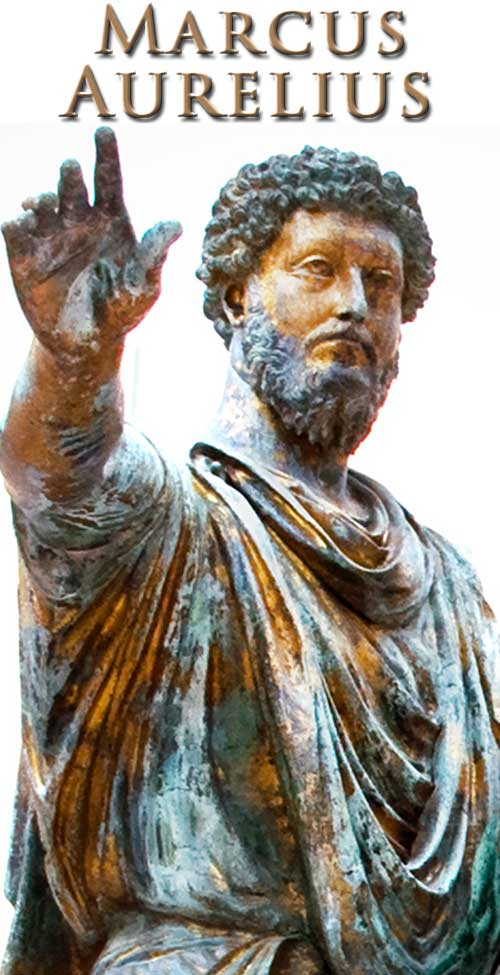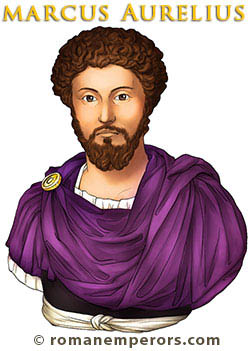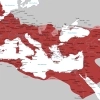Roman Emperor Marcus Aurelius
138 - 161 A.D.
Publius Aelius Marcus Aureliusus Augustus
Busts, Statues, Coins, Information, Maps, Images, and More

Marcus Aurelius: Philosopher-Emperor and Paragon of Stoicism
Marcus Aurelius Antoninus, Roman emperor from 161 to 180 AD, transcends the title of ruler. He stands as a towering figure of philosophy, embodying the principles of Stoicism and leaving behind a profound legacy that continues to resonate today.
From Humble Beginnings to the Pinnacle of Power
Born in 121 AD to a noble family, Marcus Aurelius' life took an unexpected turn at a young age. Adopted by his uncle, the emperor Antoninus Pius, he was groomed for imperial succession. His education encompassed not just military training but also philosophy, particularly Stoicism, which emphasized reason, duty, and resilience in the face of adversity.
A Reluctant Emperor Thrust into a Chaotic World
Marcus Aurelius ascended the throne alongside his adoptive brother Lucius Verus in 161 AD. Their reign was marked by constant challenges – plagues that ravaged the empire, barbarian invasions along the frontiers, and a devastating war with the Parthians.
A Stoic Leader Navigating a Turbulent Era
Marcus Aurelius, despite his philosophical inclinations, proved to be a capable military leader. He spent much of his reign on campaign, personally leading his troops against threats on the borders. However, his true strength lay in his Stoic principles. He faced adversity with unwavering duty, prioritizing the well-being of the empire above personal desires.
Meditations: A Legacy of Stoic Wisdom
While leading the Roman army, Marcus Aurelius penned his most famous work, "Meditations." These introspective writings, not intended for publication, offer a window into his thoughts and struggles. He grapples with themes of mortality, duty, and the importance of living a virtuous life in accordance with nature. "Meditations" remains a cornerstone of Stoic philosophy, inspiring countless readers with its timeless wisdom.
A Complex Relationship with Power
Marcus Aurelius' relationship with power is intriguing. He viewed rulership as a burden rather than a privilege. His Stoicism instilled in him a sense of duty to serve the Roman people, but he also yearned for a simpler life devoted to philosophy.
The Legacy of a Philosopher-Emperor
Marcus Aurelius' reign was not without its shortcomings. The plague and constant warfare strained the empire's resources. His choice of his son Commodus as successor proved disastrous, leading to a period of decline.
However, his enduring legacy lies in his character and philosophy. He stands as a symbol of Stoic virtue – a wise and just ruler who navigated a turbulent world with reason, courage, and unwavering dedication to his duty.
Beyond the Philosophical Texts: A Man of Compassion
While "Meditations" offers a glimpse into his inner world, historical accounts portray Marcus Aurelius as a compassionate leader who cared for the well-being of his subjects. He implemented social reforms, improved the lives of soldiers, and fostered a spirit of unity within the empire.
A Timeless Figure of Inspiration
Marcus Aurelius' life and philosophy continue to inspire leaders, thinkers, and individuals across the globe. His "Meditations" offer guidance on navigating challenges, dealing with emotions, and living a virtuous life. He serves as a reminder of the importance of reason, duty, and self-reflection even in the face of adversity.
The Enduring Allure of a Stoic Emperor
In conclusion, Marcus Aurelius was more than just a Roman emperor. He was a philosopher-king, a paragon of Stoic virtue, and a man who grappled with the complexities of power and the human condition. His legacy transcends the boundaries of time and place, offering timeless wisdom that remains relevant in today's world.

More to Come

"The Dutiful"
Marcus Aurelius became Emperor in 138 A.D. and, though he was born near Rome in 86 A.D. his family was from Gaul, and he was the first emperor who had roots from Gaul. Marcus Aurelius was the son of a Roman consul named Aurelius Fulvus. He was very wealthy and generous, and a solid administrator, and for this reason he was chosen by the Emperor Hadrian to succeed him. Marcus Aurelius had a long and peaceful reign as Emperor of Rome. He worked in harmony with the Senate, brought many reforms, and strengthened the borders of the empire. His integrity, gentile spirit, and dedication earned him the nickname "pius" which was given to him by the senate. Information regarding his reign is relatively lacking. In 161 A.D. he became ill and died, he was succeeded by Marcus Aurelius, his adopted son as was the plan of Hadrian.

















Latest




Popular




Useful




